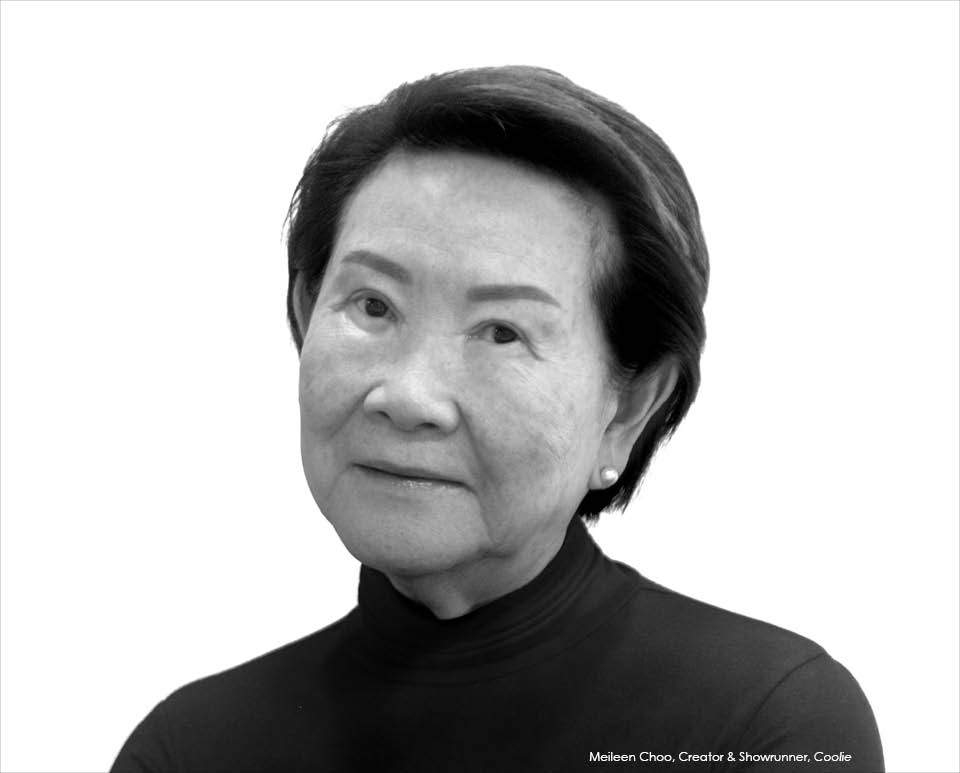
When Asian movie veteran Meileen Choo revisited an idea hovering on her wish list for three decades, her retirement project became the multi-million dollar global drama series, Coolie. Janine Stein spoke to her on the eve of production, which kicks off on 4 December.
In the heart of Havana, Cuba honours the Chinese men who fought in the independence struggle from Spanish colonial rule in the late 1800s. “There wasn’t one Cuban-Chinese deserter. There wasn’t one Cuban-Chinese traitor” – these words are etched in bronze beneath the black granite column. The origins of the Chinese presence in Cuba is longer, harder and harsher than the monument may suggest, rooted in the misery of a colonial slave trade that brought waves of indentured servants – “coolies” – from China to work on Spanish sugar and tobacco plantations.
This is the backdrop to the US$20-million Coolie, an eight-episode limited drama series directed by Taiwanese-American filmmaker, Arvin Chen (Pachinko), which starts shooting in the Dominican Republic and Panama in the first week of December.
The first project from film-industry veteran Meileen Choo’s three-year-old Cathay Film Company in Singapore, Coolie stars a multinational cast from Hong Kong, Taiwan, Cuba and Colombia in a story set in the 1860s about an illiterate young Chinese village girl, Chulin, played by Hong Kong actress/model Louise Wong (Anita). Chulin sets off from southern China to marry a rebel son, played by Taiwanese actor Joseph Chang, who is working on a sugarcane plantation in Cuba. Disguised as a man to evade the Qing militia, the canny Chulin lands in Havana clutching only her grandmother’s traditional Chinese medicine box.
“That’s all she carried with her,” Choo says, adding: “All the coolies came with nothing more than the clothes on their backs.”
Colombian star Mauricio Henao (Fake Profile) plays the sympathetic, non-slave owning plantation owner, Don Leonardo Ortega, plotting independence from Imperial Spain, aided by Chinese indentured servants and African slaves seeking freedom.
The plantation owner’s spurned wife, Maria, is played by Cuban actress Camila Arteche (Sergio & Serguei), opposite her old lover, Sian Chiong (Fidel’s Daughter), who conspire to thwart their plans, igniting an escalating series of scheming a...
When Asian movie veteran Meileen Choo revisited an idea hovering on her wish list for three decades, her retirement project became the multi-million dollar global drama series, Coolie. Janine Stein spoke to her on the eve of production, which kicks off on 4 December.
In the heart of Havana, Cuba honours the Chinese men who fought in the independence struggle from Spanish colonial rule in the late 1800s. “There wasn’t one Cuban-Chinese deserter. There wasn’t one Cuban-Chinese traitor” – these words are etched in bronze beneath the black granite column. The origins of the Chinese presence in Cuba is longer, harder and harsher than the monument may suggest, rooted in the misery of a colonial slave trade that brought waves of indentured servants – “coolies” – from China to work on Spanish sugar and tobacco plantations.
This is the backdrop to the US$20-million Coolie, an eight-episode limited drama series directed by Taiwanese-American filmmaker, Arvin Chen (Pachinko), which starts shooting in the Dominican Republic and Panama in the first week of December.
The first project from film-industry veteran Meileen Choo’s three-year-old Cathay Film Company in Singapore, Coolie stars a multinational cast from Hong Kong, Taiwan, Cuba and Colombia in a story set in the 1860s about an illiterate young Chinese village girl, Chulin, played by Hong Kong actress/model Louise Wong (Anita). Chulin sets off from southern China to marry a rebel son, played by Taiwanese actor Joseph Chang, who is working on a sugarcane plantation in Cuba. Disguised as a man to evade the Qing militia, the canny Chulin lands in Havana clutching only her grandmother’s traditional Chinese medicine box.
“That’s all she carried with her,” Choo says, adding: “All the coolies came with nothing more than the clothes on their backs.”
Colombian star Mauricio Henao (Fake Profile) plays the sympathetic, non-slave owning plantation owner, Don Leonardo Ortega, plotting independence from Imperial Spain, aided by Chinese indentured servants and African slaves seeking freedom.
The plantation owner’s spurned wife, Maria, is played by Cuban actress Camila Arteche (Sergio & Serguei), opposite her old lover, Sian Chiong (Fidel’s Daughter), who conspire to thwart their plans, igniting an escalating series of scheming and retaliation with the heart of Cuba hanging in the balance.
Half a world away from Coolie’s setting, in Singapore, Coolie’s creator and showrunner Choo talks about the series as a passion project with “drama, action, love and intensity during a real time in history with overarching themes that are still very relevant today”.
The story of Chinese slaves and migrants has gripped Choo for more than three decades, not least because her own family history involves migration to escape poor conditions and poverty, building new lives under colonial rulers and some going on to great fortune.
Choo’s family on both sides originally came from Southern China to the tin mines of Malaya. In 1935, her grandmother, Loke Yew, and her uncle, Loke Wan Tho, set up Associated Theatres, which became a household name in Southeast Asia, rebranding as the Cathay Organisation in 1959. Only when she retired from her role as CEO of the Cathay Organisation Group in 2018 after 33 years, did Choo turn her attention to creating the story that would become Coolie.
“Life got in the way,” Choo says. “I had the story, the characters, I just didn’t have the time”.
When she finally returned to the project, the first thing she did was look at international potential and commercial angles.
Originally conceived as a feature film, Coolie migrated to a series to give the story and characters space to develop, and to tap changing streaming video growth and consumption habits.
Equally big decisions were the story location, which she wanted to be in the biggest market possible with the broadest resonance. “The history of Singapore/Malaya is not universally known. So, I thought about the Hispanic world and discovered few people knew about the story of Chinese migration into Cuba. It is a very fresh story. My commercial background told me if I could have both Chinese and Spanish speaking audiences, that’s huge.”
As she continued researching, she dug deeper into the role of Chinese labourers in Cuba’s fight for independence from Spain. “I never knew Chinese played such an important role,” she says.
And here comes mention of the Havana monument to the Chinese who fought the Spanish. “So few people know about this. Not even my Cuban stars knew.”
If the decision to set the story in Cuba is relatively new, Choo’s interest in Cuba goes way back.
“I like history a lot... and I’ve always been interested in the Chinese Diaspora,” Choo says. When, in the early 1990s, she read an article about three Chinese men still using block printing in Havana to produce newspapers, she decided to try to find them.
She arrived in Cuba to find that the three were away visiting their families. But she explored Chinatown, chatting to the few men who could still speak Cantonese and absorbing sights, smells and background for what would eventually become her drama series.
“I had already conceived the story by then but had not made up my mind where the story would take place. When I heard about the important role the Chinese played in the Cuban War of Independence and saw the monument honouring the Chinese, I decided to set the story in Cuba,” she says.
Coolie’s time frame – around 1860, during the guerilla warfare stages of the battle for independence – was set with a clear eye on budget. While much bigger than the majority of TV series being made in Asia, the budget wouldn’t stretch to full-on battle scenes that would have been involved in realistically portraying an all-out war.
Inspired by generations of strong women in her family, Choo decided to make Coolie a woman’s story crafted around the central theme of the social and other constraints that enslave us, and the journey to freedom.
By her own admission, film, rather than TV, is her comfort zone. Her long career in movie production, exhibition and distribution includes executive producer credits on director Ong Keng Sen’s Army Daze, which broke box office records in Singapore in 1996; Tsui Hark’s A Chinese Ghost Story; Pen-Ek Ratanaruang’s Last Life in the Universe, starring Tadanobu Asano; Atsuko Hirayanagi’s Oh Lucy, starring Josh Hartnett; and Arvin Chen’s Au Revoir Taipei; among others.
Choo became showrunner unintentionally. “I know my story best,” she said, having weathered a few false starts and decisions that, in hindsight, she would not have made.
Other than Cathay Organisation’s, there is no Singapore money – government or other – involved in Coolie and nothing will be shot in Singapore.
Choo explains she has tapped the best of what Singapore has to offer: production financing and management, legal and insurance. “These are Singapore’s main strengths, which can be used for productions all over the world. Sadly, we are not putting enough emphasis on these strengths. It’s not important that the film be made in Singapore,” she says.
What she has as the show goes into production is the best she could find across talent, skillsets and geographies, including an Argentinean set designer, a casting director from Mexico living in the U.S., a Korean-German executive producer, a British DoP, and a Cuban star of mixed Chinese descent with the same family name as her husband. That’s the bit she calls kismet. “We are a United Nations unto ourselves,” she jokes.
The series, scheduled to shoot until mid-April 2024, is produced by Ed Buhr (Unhung Hero) with In-Ah Lee (Land of Plenty) as executive producer. The distribution platform has not yet been announced.
If there is a “best thing” about Coolie so far, it’s that “I learned a lot about the Chinese diaspora... about places that I didn’t know the Chinese had gone, and I thought wow, if my grandfather had not come here to Singapore, he might have landed up in the tin mines in Bolivia then I’d be speaking Spanish today.
“To me, we should never stop learning. This production has taught me so much.”



















